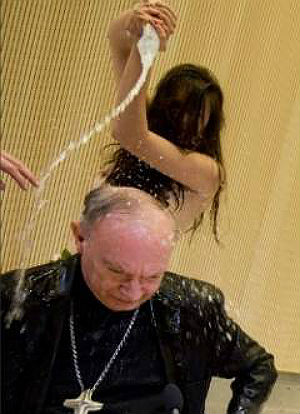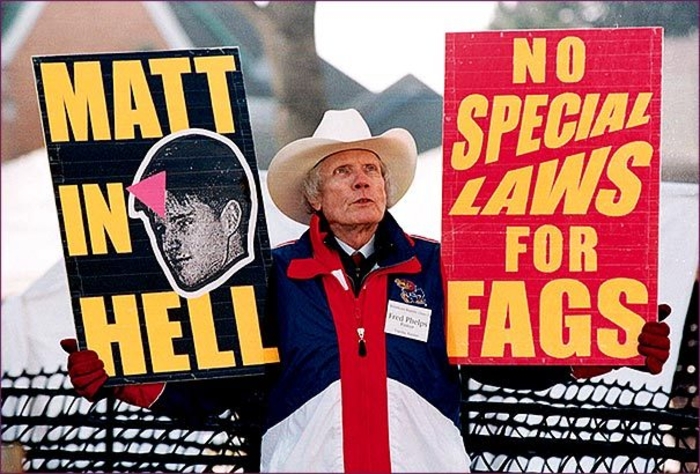I have a dogmatic certainty: God is in every person’s life. God is in everyone’s life. Even if the life of a person has been a disaster, even if it is destroyed by vices, drugs or anything else—God is in this person’s life. You can, you must try to seek God in every human life. Although the life of a person is a land full of thorns and weeds, there is always a space in which the good seed can grow. You have to trust God.
(Pope Francis, “A Big Heart Open to God“)
The Pope’s interview in America was all anyone talked about last week. I don’t know how they did it…it took me most of the week, all of the weekend, and most of yesterday to read and re-read it enough times, and in the right spirit, before I felt up to the task of typing a single word. Even now I feel a little anxious.
I could feel the Holy Spirit moving through Pope Francis’ words. That’s not something I say often, wary as I am of sentimentality and emotionalism in religion, but I say it now because rather than inspiring in me the warm fuzzies, I felt very…small. Awed. Overshadowed. Frightened. Encouraged, as well, and certainly loved, but in a way that made me realize that there was danger for me, here. A danger of latching onto the Pope’s words as justification for anything I’ve said or felt or typed. A danger of patting myself on the back with my digital copy of America, of curling up to sleep secure in the sweet knowledge that I’m so wise and good that even the Pope agrees with me, a danger, in short, of crushing a powerful yet fragile offering of the Holy Spirit and reshaping it to please myself, instead of allowing it to reshape me.
God is greater than sin, the Pope reminded me. I desperately needed that reminder. About some sins I am quite patient, but about others — like self-righteousness — I am blisteringly self-righteous. I’m poised to find self-righteousness in certain places before I’m even there. I was ready for it in Ave Maria, and spent nearly two years seeing it everywhere. Now, by the grace of God, I’m starting to realize that I imposed quite a bit of that self-righteousness on perfectly innocent actions or conversations, and probably created a fair amount of wounds doing so. I type these words with some trepidation, but mostly with confidence that God is greater than my sin and that His mercy lives in the hearts of the people here.
I can’t help but believe that the Spirit who helped me see that I have been blinded by my own pride will help others see that in every sinner, even the egregious ones, even the flamboyantly egregious ones, even the most unapologetic, blasphemous, flamboyant, egregious sinner (of whose numbers I could once count myself), there is a person whom God loved enough to die for.
It was impossible for me to read the interview, try as I did, without having in mind Jody Bottum’s article, my own response, and all that flowed from it. That post was a flashpoint for me, one of the times when I feel such ground-shifting uncertainty that I wonder whether I should stop blogging altogether. I was helped by some wise friends who advised me that strictly on the legal level, the law functions more as a teacher in a society as pluralistic as ours, and not so much as a reflection of popular opinion. In that understanding, I think I can safely say that I should not dismiss the legal battle over gay marriage as easily as I did. I think I can also safely say, though, that having neither the time nor the mental acuity to tease it all out, I will leave the legal standing of gay marriage in the hands of those who are undoubtedly more competent than I. The legal standing of gay marriage in America will neither rise nor fall based on the opinion of a mediocre mom with an internet connection, thank goodness.
But there is this question of culture that plagues me. The way we embody the culture of Christ, the way we encounter the secular culture, the way we to try to shape and change it, and here I don’t mean in the academy or the courtroom. I mean in the agora. In front of the church after Mass, on the street outside while the kids play, on playdates, over drinks with friends, on the phone, over family dinners…but also in the virtual agora.
I believe, deeply, that the way most Catholics I know are going about answering the “question” of gay marriage is wrong in spirit. Not just a little off, but profoundly at odds with Christ and the Church. Most of the people I spoke to laughed and dismissed my insistence that this is clearest on facebook, but I wasn’t joking. Facebook isn’t something you can dismiss. Social media is a real place, where real exchanges are made, real hearts are changed, and real people are wounded. Ignoring that potential is ignoring people. Things like changing a profile picture to an unequal sign is the virtual equivalent of wearing a shirt like this everywhere:
Gosh, it may be true, you know? It may be the teaching of the Church. It may be not only true, but also an essential truth for our culture. But no one will look at that and see truth unless they already agree with you. And then, as the Anchoress reminds us, they’re not so much agreeing with truth as they are agreeing with themselves. Pleased to see their own thoughts reflected back at them. Applauding themselves in a pleasantly echoing chamber.
The day I wrote that post, my combox filled up with Matthew 10. I used to think I understood what that verse meant…that we would have to fight the world for Christ. Lately I’ve been wondering if I misunderstood. If maybe Christ isn’t the sword with which we slash at the world, but the sword that severs us, however painfully, from it. But still, I don’t know what that means in any practical way. Especially when you flip back a few pages and read the Beatitudes, where Christ praises the peacemakers and the merciful.
It’s been frustrating me, dwelling on what Christ said in that verse. So in the past week I decided to look instead at what Christ did.
Now he had to go through Samaria. So he came to a town in Samaria called Sychar, near the plot of ground Jacob had given to his son Joseph. Jacob’s well was there, and Jesus, tired as he was from the journey, sat down by the well. It was about noon.
When a Samaritan woman came to draw water, Jesus said to her, “Will you give me a drink?” (His disciples had gone into the town to buy food.)
The Samaritan woman said to him, “You are a Jew and I am a Samaritan woman. How can you ask me for a drink?” (For Jews do not associate with Samaritans.[a])
Jesus answered her, “If you knew the gift of God and who it is that asks you for a drink, you would have asked him and he would have given you living water.”
I love this story. I always have. I love it because the woman is clearly shocked by Jesus shattering the social code, and Jesus is so unaffected by the social code that he doesn’t even answer her question. It’s irrelevant to him. He’s concerned about her.
“Sir,” the woman said, “you have nothing to draw with and the well is deep. Where can you get this living water? Are you greater than our father Jacob, who gave us the well and drank from it himself, as did also his sons and his livestock?”
Jesus answered, “Everyone who drinks this water will be thirsty again, but whoever drinks the water I give them will never thirst. Indeed, the water I give them will become in them a spring of water welling up to eternal life.”
The woman said to him, “Sir, give me this water so that I won’t get thirsty and have to keep coming here to draw water.”
He told her, “Go, call your husband and come back.”
“I have no husband,” she replied.
Jesus said to her, “You are right when you say you have no husband. The fact is, you have had five husbands, and the man you now have is not your husband. What you have just said is quite true.”
“Sir,” the woman said, “I can see that you are a prophet. Our ancestors worshiped on this mountain, but you Jews claim that the place where we must worship is in Jerusalem.”
“Woman,” Jesus replied, “believe me, a time is coming when you will worship the Father neither on this mountain nor in Jerusalem. You Samaritans worship what you do not know; we worship what we do know, for salvation is from the Jews. Yet a time is coming and has now come when the true worshipers will worship the Father in the Spirit and in truth, for they are the kind of worshipers the Father seeks. God is spirit, and his worshipers must worship in the Spirit and in truth.”
The woman said, “I know that Messiah” (called Christ) “is coming. When he comes, he will explain everything to us.”
Then Jesus declared, “I, the one speaking to you—I am he.”
He told her the truth, you see. He didn’t skate around it or pretend it wasn’t there. But first he showed her that he cared more about her than he did about all the rest of it. Society. The divisions between them. Even her sins, in the end, were not the primary concern he had for her. The primary concern he had for her was that she not leave that place bereft of the living water.
The most important thing is the first proclamation: Jesus Christ has saved you. And the ministers of the church must be ministers of mercy above all.
(Pope Francis, “A Big Heart Open to God“)
It’s funny, though, that I would think that passage is appropriate. It’s really not. When it comes to Christ, we’re all the woman at the well. Desperate for the living water and with five husbands behind us that no one knows about. Melanie said in my combox that evangelization is really one beggar telling another beggar where to find bread. I think if we really believed that, we wouldn’t be so quick to lambast another beggar if he said, “hey, there might be bread here too,” or even, “hey, maybe we could do something different with this bread.” We wouldn’t scream at beggars who were too malnourished to move that if they would just get up and go where we were telling them to go, they wouldn’t die already, the idiots. We’d reach out our hands and pull them up and support them, step by step, even if they cried that we were killing them, that we hated them, that all they wanted to do was lay down and go to sleep.
“Speaking the truth in love” does not, I think, mean that speaking the truth is love. Just speaking the truth, that’s not enough. It has to be in love. In a state of love. In an environment of love. In the kind of love that allows someone to trust, to relax, to let their guard down enough to listen. But then again, the goal can’t be to get them, whoever “they” may be, to let their guard down. The goal should be the same as ever…to love the Lord our God, and to love our neighbor as ourselves. The truth part has to spring out of the love part, or we’re using Christ as a sword. And the more I think about it, the more convinced I am that that’s not what he had in mind when he was talking to Matthew.
Someone said to me the other day that it’s hard to find a perfect strategy for fighting a mean-spirited, narcissistic movement. I think the crux of the issue is right there. “Fighting a movement.” It’s easy to be angry, bitter, or downright hateful toward a movement. A faceless, nameless entity, so removed that the only human image associated with it looks like this:
The thing is, living in isolated communities and echo chambers as we tend to do, we forget that the street goes both ways. The number of people who have never met a real, live, Mass-going Catholic is not negligible. For that matter, the human images associated with contemporary Christianity are about on par with the image above.
When you get right down to it, even the idea of “people” is an abstraction. It’s easy to hate an abstraction, because you don’t have to deal with the consequences. The gay marriage movement can’t have its feelings hurt, can’t be wounded, can’t be hurt or scarred or angry by the way anyone treats it or talks about it. Same goes for the anti-gay marriage movement. So everyone feels like they have carte blanche to say what they want without the risk of damaging a human soul, because they’re talking about a movement, lots of people, not a person, not that person, not you, not me. But they don’t. There is no such thing as “people”. There is only a person, many persons, each of them with a soul beloved of God.
When does a formulation of thought cease to be valid? When it loses sight of the human or even when it is afraid of the human or deluded about itself. The deceived thought can be depicted as Ulysses encountering the song of the Siren, or as Tannhäuser in an orgy surrounded by satyrs and bacchantes, or as Parsifal, in the second act of Wagner’s opera, in the palace of Klingsor. The thinking of the church must recover genius and better understand how human beings understand themselves today, in order to develop and deepen the church’s teaching.
(Pope Francis, “A Big Heart Open to God“)
I think it’s destructive to think and act in terms of “fighting a battle.” To be sure, there is a vast battle raging…but we’re not fighting people, we’re fighting evil, demons, Satan, and the forces of darkness. There are people everywhere who are suppressed or oppressed or held in thrall by the darkness, and making sure they know how dark the darkness is won’t help them. What will help them is bringing the light. Heal the wounds, the pope said. Heal the wounds.
There are wounds everywhere, on both sides of this issue. Both sides have been vicious. Despite endless cries for tolerance, we live in a profoundly caustic and unloving culture, and nowhere is that more apparent than in the culture wars. But if we persist in the mentality that we’re fighting a war against other people, we’ve already lost.














